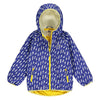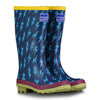Interview with Uju Asika, multiple award-nominated blogger, screenwriter and creative consultant on her first book.
- First of all, congratulations on your first book, ‘BRINGING UP RACE: HOW TO RAISE A KIND CHILD IN A PREJUDICED WORLD.’. Most of our readers know you as a multiple award-nominated blogger, screenwriter and creative consultant. What inspired you to write this book?
The idea came from a relative who thought it would be the perfect topic for me to write about as the mother of two Black boys in Britain. I was very resistant to the project initially for a number of reasons, ranging from imposter syndrome (very typical for mums and creatives) to wondering if I would be able to write a whole book on the topic. After all, ‘race’ wasn’t exactly my professional speciality. However, once I decided to draw from my personal experiences, as well as speaking to a range of different parents and doing lots of research, I felt excited to get my teeth into it. There was so much ground to cover!
- What aspects of parenting does the book touch on?
As the title suggests, the main topic is race and how to raise anti-racist children. However, the underlying theme of the book is about kindness and how do we raise kids who are thoughtful, empathetic and open to difference in all its forms. The book features personal stories as opposed to ‘strategies’ because I didn’t want it to come across preachy or didactic. It’s not your standard parenting manual but it does contain lots of practical advice. I want to empower readers to start having these important conversations in their homes and communities.
- What was your experience like bringing up your children in London?
For the most part, it’s been brilliant. I’m a proud Londoner and I’ve loved raising my boys in such a multicultural city. They go to the local schools with a mix of people from all different backgrounds. On the other hand, especially as a Black mother bringing up two sons in London, you worry a lot about stuff like rising knife crime and gang violence. Now they are both in secondary school, they move around independently and I have to trust that they know how to avoid trouble. We have talks about how best to keep themselves safe, but it does tie my stomach in knots when I think about it too much! Ultimately, so much of parenting is about worrying and at a certain point you have to inhale, let go and keep the faith that all will be ok.
- How does your book help parents of all colours and ethnicities?
I was deliberate in writing this book for all parents, not just Black parents or White parents because race is something that affects everyone. For Black, Asian or ethnic minority parents reading the book, I think they will find many of the stories very relatable. Stories of experiencing racism or bigotry, ranging from being bullied at school to having your hair mocked or people refusing to pronounce your name correctly. For White parents, the book offers a direct insight into what racism feels like and what they can do to raise children with strong antiracist values. My goal was to help every parent, no matter their ethnicity, to feel more confident in talking about race with their kids and to teach the next generation to challenge prejudice, however and wherever it appears.
- How and when do you recommend parents talk to children about race? Would you say that you can start at any age?
Yes, 100% you can start talking about race with your kids from birth! In the book, I refer to a blogger and race educator Sachi Ferris who recommends talking to your baby about race, for instance, reading books together and pointing out different skin tones and ethnic backgrounds. The younger you start, the more practice you get and the easier it becomes. Kids are actually learning about race all the time from society, whether we say anything or not. As a parent, it makes sense to guide them through whatever questions might come up, so they don’t just make it up on their own!
- How can parents handle awkward questions their children ask them?
Try not to panic! But even if you do panic, don’t panic about panicking. It’s all perfectly normal and I share some of my own experiences around that in the book. A good response is to breathe, take a moment to collect yourself and then respond in a calm and open way. I always find being as direct and honest as possible works best. Also, you don’t have to go into a long lecture, simply answer factually and according to their age level. Remember to be positive and inclusive in the language you use. It’s helpful to educate yourself about race issues, especially if you are unsure about what to say. The good thing is you don’t have to pretend to know it all and you can learn things alongside your child.
- Are there any resources, books, websites, tv programmes that you recommend to help parents introduce race as a topic to their children?
There are loads of excellent resources that can help you introduce race and keep these conversations going. I have a list of
diverse and multicultural books at the back of Bringing Up Race and also on the blog. I also have a selection of
films and shows about race on the blog that you can watch with your family. I’ll be adding more antiracism links on the blog including some good podcasts for kids and grownups.
- Where can our readers find you?
You can find me at Babes about Town, where I share my best parenting tips and ideas for fun stuff to do with the family. I’m also @Babesabouttown on Twitter, Instagram, Facebook and Pinterest. And of course, you can buy the book Bringing Up Race: How to Raise a Prejudiced Child on Amazon, Waterstones and other good bookshops. If you have a copy, do share with the hashtag #BringingUpRace and tag me, as I love seeing the book out in the wild!
Bringing Up Race: How to Raise a Kind Child in a Prejudiced World by Uju Asika, published by Yellow Kite (Hachette) is available on Amazon UK, Waterstones and other good bookshops.








